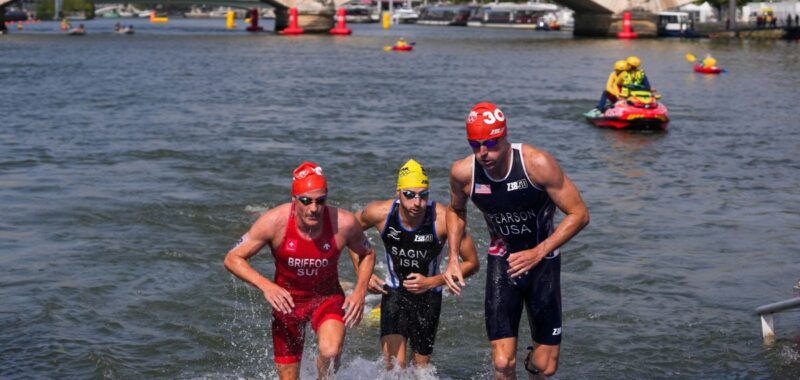
Not only is Coca-Cola an official sponsor for the Paris Olympics, but it’s received ringing endorsements from some athletes. Olympic swimmers are chugging Coke after events because of its supposed ability to stave off bacteria and stomach issues—a real concern for those swimming in a heavily polluted Seine river.
“The myth of Coca-Cola is true,” Moesha Johnson, an Australian marathon swimmer, told the Wall Street Journal. “We will often have a Coca-Cola afterwards just to try to flush out anything inside of us.”
Other Olympians agree: A gulp of Coca-Cola after a dip in the Seine can be an elixir against stomach-irritating bacteria and viruses. Fizzy beverages have long been a home remedy for gastrointestinal distress, with the rationale being that bubbles settle the stomach and sugars in the drink replenish glucose. But doctors are lukewarm on the treatment, instead recommending natural anti-inflammatories like ginger in place of a sugar-loaded swig that can cause even more stomach upset. Some long distance runners, however, still swear by the drink to give a late-race boost of energy.
Coca-Cola was already on the rocks with health experts, who have accused the company of “sportswashing” sugary soft drinks, and environmental activists, who have criticized the company’s distribution of the drink in plastic bottles during games. Coca-Cola has said it offers sugar-free alternatives, and the Olympics Committee has stood by its partnership with the drinks brand.
But the soda’s supposed health properties aside, its popularity as a stomach-settling antidote has piled on concerns about the cleanliness of the Seine. Davey Jones, professor of environmental science and public health at Bangor University, told BBC Science Focus the river, which hosted the triathlon and swimming marathon events, is replete with odious microorganisms like bacteria and viruses. If the Seine contains E. coli, which is indicative of the presence of sewage or animal feces in a body of water, it likely also contains norovirus, the most common cause of gastroenteritis, which causes cramps, vomiting, and diarrhea.
“Whenever there’s sewage overflow, for example, into the Seine, norovirus gets released into the water,” Jones said. “You only need, in theory, to ingest one to ten viral particles to get sick. And when we’re sick, every time we go to the toilet, we emit trillions of these viral particles.”
E. coli’s Olympic mettle
The presence of bacterial and viral particles in the Seine have had an unwelcome spotlight leading up to and during the Olympics. At the beginning of the games, pollution in the Seine delayed the men’s triathlon by a day after officials canceled a training session for the event. Water tests showed elevated E. coli levels after a heavy rain storm. Two triathlete swimmers dropped out of competition due to illness, though neither linked it with swimming in the Seine.
“For the moment, there is no direct link between the Seine and any illness,” Paris deputy mayor Pierre Rabadan said in a press conference Monday.
But concerns about the cleanliness of the Seine did not begin just prior to the Olympics. For decades, the river—a vital artery in the heart of Paris—has been considered a cradle for pollution. Like many old cities, Paris’s sewage system combines both sewage and stormwater, and after long periods of rain, waste doesn’t get treated before flowing into the Seine.
Though Paris has long promised a long term solution to the river’s pollution, an Olympic deadline pushed the project into high gear. The city invested $1.5 billion in cleaning the river before the games, a process that required building a massive underground basin for rainwater to be funneled to treatment centers before joining the river. Paris mayor Anne Hidalgo even promised to take a swim in the river after the cleanup efforts. But skeptics made their thoughts clear, with some threatening to hold a protest by defecating in the river ahead of the officials’ promised swim.
The post-Olympics future of the Seine is still in question. The city’s cleanup efforts were successful in allowing Olympic events to take place in the river, but spats of heavy rain still threaten safe water conditions. With climate change making extreme weather both more common and unpredictable, treatment of the Seine—and finding lasting solutions to pollution—promises to be a persisting issue.
“The success will be complete if politicians and scientists keep up their efforts for the next few years,” Jean-Marie Mouchel, professor of hydrology at Sorbonne University, told Wired.

